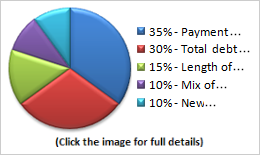Home > How to Avoid Bad Credit > How to Deal With Collection Agencies on Your Credi...
How to Deal With Collection Agencies on Your Credit Report
Posted on March 11, 2011
Clearing up your credit history often will involve handling collection agencies that have assumed your old debts. Collection agents are infamous for using tactics that are less-than-nice when trying to get back money owed. In many cases, a collection agent will get paid a percentage of the debt they are collecting on so they utilized no-holds-barred techniques to get a payment.
For some consumers who show collection agency information on their credit report, it can be difficult to negotiate the removal of the data from the report. But there are methods to be considered when trying to clear a collection agency debt from your consumer credit report.
Here are four options you have for handling a collection agency debt:
Pay Up In full
If the collection agency is able to validate your debt and it is a relatively small amount, it may be in your best interest to pay the balance off in full with the contingency that the debt information will be removed from your credit report. Not all collection agencies will be cooperative but many will agree to remove the data once the debt has been satisfied in full. They want to get back as much money as possible so they will be somewhat open to working with you. Too many consumers fail to ask for the incentive when they agree to pay in full so they end up with no real changes on their credit report. Get any agreements in writing.
Ask for a Settlement
For larger debts you can not afford to pay in full, discuss with the agent a settlement amount agreeable to both parties. Tell the agent the lowest reasonable amount you can afford to pay so you have room for negotiations if they want more. Typically, collection agencies will be agreeable to a settlement provided you agree to pay in one lump sum. When you negotiate, make sure you actually have the funds to cover a one-time payment or it may be much harder to negotiate a second time. When you agree to settle with lump sum payments, make sure to inquire about the agency agreeing to remove the information from your credit report. Again, if you are planning to pay off much of the debt, they may be willing to remove their data. If they agree, make sure you get a written confirmation.
Dispute Data With Credit Bureaus
If you are exploring your credit report and come across some collection agency information that you either do not recognize or contend you don’t owe, file a dispute with the credit reporting bureaus who must investigate the matter in 30 days. The credit bureaus have to make contact with the collection agency and will request proof of the debt owed. If they can not provide this information, the credit bureau must delete the negative information from your credit report. Once this data is gone, you can see a rise in your credit score. If the debt is legitimately yours, you will have to make good on the debt in order for a change to be made on your credit history. The good news for the consumer is that many creditors and collection agencies do not keep records for years on end so it may be difficult for them to provide proof of debts to the credit reporting agencies.
Dispute Debts with Collection Agency
The Fair Credit Reporting Act makes it possible for consumers to dispute the information provided by a collection agency. The rights of the consumer involve the ability to request an account investigation which must be completed within 30 days of receipt of the request, much like a credit bureau investigation. If the collection agency fails to reply in the time period, the information must be removed from a credit report by law. This essentially means the collection agent can not prove you owe the debt. If they can’t prove it to you, they can’t prove it to the credit bureaus and the offending information must be deleted.
Similar Posts:
- How Are Collection Accounts Handled on a Credit Report?
- How to Repair Credit After a Lender “Charge Off”
- Credit Repair Don’t: Dispute Everything On Your Credit Report
- Does Debt Management Assistance Hurt Your Credit?
- Why You Shouldn’t Let Old Accounts Fall Off Credit Reports







Let's connect!